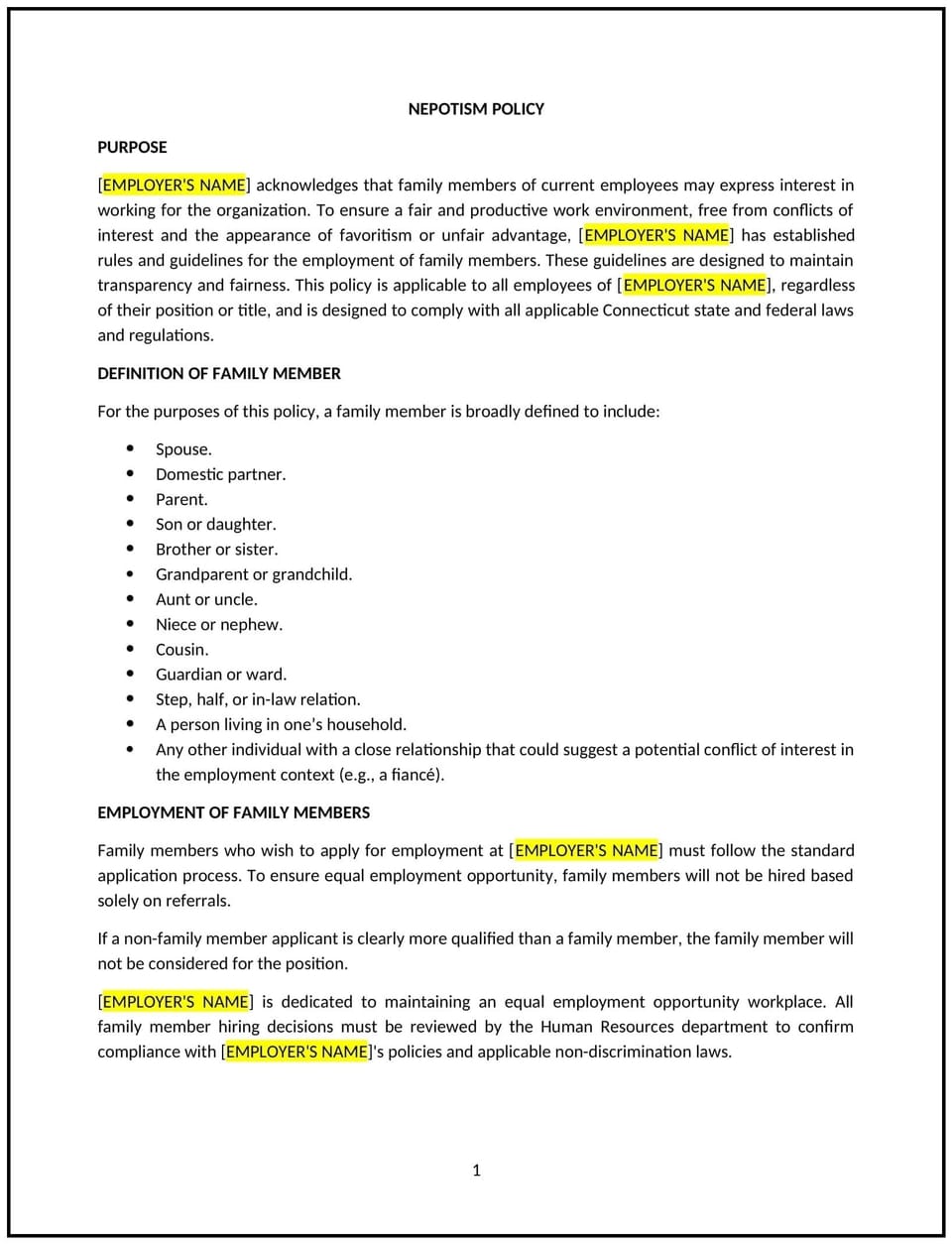Nepotism policy (Connecticut): Free template

Nepotism policy (Connecticut)
A nepotism policy helps Connecticut businesses ensure that family relationships do not interfere with fair hiring, promotion, and management practices. This policy outlines the company’s stance on hiring or promoting family members, managing conflicts of interest, and maintaining a fair and professional work environment for all employees.
By implementing this policy, businesses can promote fairness, prevent favoritism, and create a workplace culture based on merit, while maintaining legal compliance with employment laws.
How to use this nepotism policy (Connecticut)
- Define nepotism: Clearly explain what constitutes nepotism, including situations where family members are involved in hiring, promotion, or supervision, and specify the circumstances under which family members can or cannot be employed.
- Set approval procedures: Establish guidelines for disclosing family relationships during the hiring process, and set approval procedures for hiring family members in certain roles to ensure transparency.
- Address conflicts of interest: Ensure that family relationships do not create a conflict of interest in decision-making, such as favoritism, biased performance evaluations, or inappropriate influence over workplace decisions.
- Specify hiring restrictions: Clearly outline the roles and departments where family members may or may not be hired, such as avoiding family members working directly under each other or in positions that may lead to conflicts of interest.
- Foster transparency: Encourage employees to disclose any potential conflicts related to family relationships, and establish a process for handling such disclosures in a fair and consistent manner.
- Maintain fairness: Emphasize the importance of merit-based decisions in hiring, promotion, and compensation, ensuring that family relationships do not affect these decisions.
Benefits of using this nepotism policy (Connecticut)
This policy offers several benefits for Connecticut businesses:
- Promotes fairness and equality: Ensures that hiring, promotion, and compensation decisions are made based on merit, not family relationships, fostering a more inclusive and equitable workplace.
- Reduces legal risks: Helps avoid potential legal claims related to favoritism, discrimination, or unfair treatment of employees, reducing the risk of lawsuits or penalties.
- Strengthens workplace culture: By addressing nepotism concerns, businesses can reduce conflicts and create a more professional, productive work environment.
- Enhances transparency: Provides a clear, transparent process for managing family relationships in the workplace, ensuring that all employees are treated fairly and equally.
- Improves employee morale: Ensures that employees feel they are being judged based on their abilities and performance, rather than their familial ties, contributing to higher job satisfaction and engagement.
Tips for using this nepotism policy (Connecticut)
- Communicate the policy clearly: Ensure that all employees are aware of the policy, especially those involved in recruitment, promotion, and management decisions.
- Enforce consistently: Apply the policy consistently to avoid perceptions of favoritism, ensuring all family relationships are treated fairly in accordance with the guidelines.
- Regularly review hiring decisions: Periodically review the hiring, promotion, and management decisions to ensure they align with the policy and are made based on merit.
- Foster an open dialogue: Encourage employees to raise concerns or disclose potential conflicts regarding family relationships in a confidential manner to avoid any misunderstandings.
- Review periodically: Update the policy to reflect any changes in Connecticut laws, business practices, or feedback from employees to ensure it remains relevant and effective.
Q: How does this policy benefit my business?
A: The policy promotes fairness and transparency in hiring and promotion decisions, reduces the risk of favoritism and discrimination, and helps maintain a professional and merit-based work environment.
Q: Are family members allowed to work for the company?
A: Yes, but there may be restrictions depending on the role. Family members may not be hired in positions where there is a direct reporting relationship, or where their employment could create a conflict of interest, such as in sensitive decision-making areas.
Q: What should I do if a family member works in the company?
A: Employees should disclose any family relationships as soon as they arise. The company will review the situation to ensure there are no conflicts of interest and that all decisions are made fairly and based on merit.
Q: How can I ensure that the policy is applied fairly?
A: Apply the policy consistently to all employees, ensure that family relationships are disclosed early in the hiring process, and monitor hiring and promotion decisions to ensure that they are based solely on qualifications and merit.
Q: How often should this policy be reviewed?
A: The policy should be reviewed annually or whenever there are updates to Connecticut laws, changes in business practices, or employee feedback to ensure it remains effective and compliant.
This article contains general legal information and does not contain legal advice. Cobrief is not a law firm or a substitute for an attorney or law firm. The law is complex and changes often. For legal advice, please ask a lawyer.


